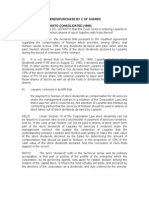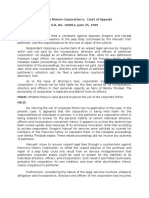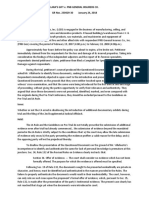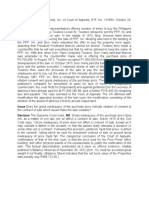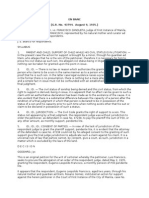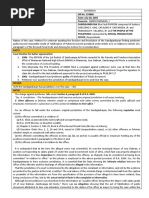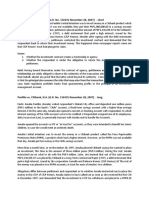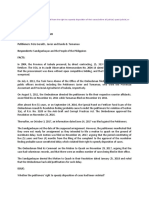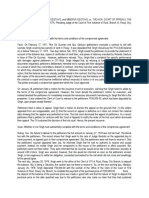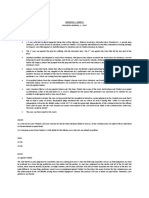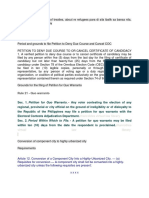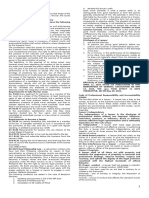Luxuria Homes Vs CA
Luxuria Homes Vs CA
Uploaded by
Jillian AsdalaCopyright:
Available Formats
Luxuria Homes Vs CA
Luxuria Homes Vs CA
Uploaded by
Jillian AsdalaOriginal Description:
Original Title
Copyright
Available Formats
Share this document
Did you find this document useful?
Is this content inappropriate?
Copyright:
Available Formats
Luxuria Homes Vs CA
Luxuria Homes Vs CA
Uploaded by
Jillian AsdalaCopyright:
Available Formats
Luxuria Homes vs.
Court of Appeals
[GR 125986, 28 January 1999]
First Division, Martinez (J):4 concur
Facts: Aida M. Posadas and her two (2) minor children co-owned a 1.6 hectare property in Sucat, Muntinlupa, which was occupied by squatters.
Posadas entered into negotiations with Jaime T. Bravo regarding the development of the said property into a residential subdivision. On 3 May 1989,
she authorized Bravo to negotiate with the squatters to leave the said property. With a written authorization, Bravo buckled down to work and
started negotiations with the squatters. Meanwhile, some 7 months later, on 11 December 1989, Posadas and her children, through a Deed of
Assignment, assigned the said property to Luxuria Homes, Inc., purportedly for organizational and tax avoidance purposes. Bravo signed as one of
the witnesses to the execution of the Deed of Assignment and the Articles of Incorporation of Luxuria Homes, Inc. Then sometime in 1992, the
harmonious and congenial relationship of Posadas and Bravo turned sour when the former supposedly could not accept the management contracts
to develop the 1.6 hectare property into a residential subdivision, the latter was proposing. In retaliation, Bravo demanded payment for services
rendered in connection with the development of the land. In his statement of account dated 21 August 1991, Bravo demanded the payment of
P1,708,489.00 for various services rendered, i.e., relocation of squatters, preparation of the architectural design and site development plan, survey
and fencing. Posadas refused to pay the amount demanded. Thus, in September 1992, James Builder Construction and Jaime T. Bravo instituted a
complaint for specific performance before the trial court against Posadas and Luxuria Homes, Inc. On 27 September 1993, the trial court declared
Posadas in default and allowed James Builder Construction and Bravo to present their evidence ex-parte. On 8 March 1994, it ordered Posadas,
jointly and in solidum with Luxuria Homes, Inc., to pay Bravo, et. al. the balance of the payment for the various services performed by them in the
total amount of P1,708,489.00; actual damages incurred for the construction of the warehouse/bunks, and for the material used in the total sum of
P1,500.000.00; moral and exemplary damages of P500.000.00; Attorney's fee of P50,000.00; and cost of this proceedings. The court also directed
Posadas as the Representative of the Corporation Luxuria Homes, Incorporated, to execute the management contract she committed to do, also in
consideration of the various undertakings that Bravo rendered for her.
Luxuria Homes and Posadas appealed to the Court of Appeals. The appellate court affirmed with modification the decision of the trial court. The
appellate court deleted the award of moral damages on the ground that James Builder Construction is a corporation and hence could not
experience physical suffering and mental anguish. It also reduced the award of exemplary damages. Luxuria Homes' and Posadas' motion for
reconsideration, prompting them to file the petition for review before the Supreme Court.
Issue: Whether Luxuria Homes, Inc., was a party to the transactions entered into by Posadas with Bravo and James Builder Construction and thus
could be held jointly and severally with Posadas.
Held: It cannot be said then that the incorporation of Luxuria Homes and the eventual transfer of the subject property to it were in fraud of Bravo
and James Builder Construction as such were done with the full knowledge of Bravo himself, as evidenced by the Deed of Assignment dated 11
December 1989 and the Articles of Incorporation of Luxuria Homes, Inc., issued 26 January 1990 were both signed by Bravo himself as witness.
Further, Posadas is not the majority stockholder of Luxuria Homes, Inc. The Articles of Incorporation of Luxuria Homes, Inc., clearly show that
Posadas owns approximately 33% only of the capital stock. Hence, Posadas cannot be considered as an alter ego of Luxuria Homes, Inc. To
disregard the separate juridical personality of a corporation, the wrongdoing must be clearly and convincingly established. It cannot be presumed.
Bravo, et. al. failed to show proof that Posadas acted in bad faith, and consequently that Luxuria Homes, Inc., was a party to any of the supposed
transactions, not even to the agreement to negotiate with and relocate the squatters, it cannot be held liable, nay jointly and in solidum, to pay
Bravo, et. al. Hence, since it was Posadas who contracted Bravo to render the subject services, only she is liable to pay the amounts adjudged by the
Court.
You might also like
- Quiz in Law On PUblic Corporation - Attempt Review100% (1)Quiz in Law On PUblic Corporation - Attempt Review26 pages
- G.R. Nos. 115908-09 March 29, 1995 PEOPLE OF THE PHILIPPINES, Plaintiff-Appellee, vs. DANNY GODOY, Accused-Appellant. JUDGE EUSTAQUIO Z. GACOTT, JR. Complainant, vs.67% (3)G.R. Nos. 115908-09 March 29, 1995 PEOPLE OF THE PHILIPPINES, Plaintiff-Appellee, vs. DANNY GODOY, Accused-Appellant. JUDGE EUSTAQUIO Z. GACOTT, JR. Complainant, vs.2 pages
- Times Transportation Company Vs Santos SoteloNo ratings yetTimes Transportation Company Vs Santos Sotelo2 pages
- COASTAL PACIFIC TRADING, INC., vs. SOUTHERN ROLLING MILLS, CO., INC. (Now Known As Visayan Integrated Steel Corporation), Et - AlNo ratings yetCOASTAL PACIFIC TRADING, INC., vs. SOUTHERN ROLLING MILLS, CO., INC. (Now Known As Visayan Integrated Steel Corporation), Et - Al3 pages
- Coastal Pacific Trading vs. Southern Rolling Mills50% (2)Coastal Pacific Trading vs. Southern Rolling Mills1 page
- G.R. No. 187262, January 10, 2019 - Engineering Geoscience, Inc., Petitioner vs. Philippine Savings Bank, Respondent.No ratings yetG.R. No. 187262, January 10, 2019 - Engineering Geoscience, Inc., Petitioner vs. Philippine Savings Bank, Respondent.2 pages
- Rizal Light & Ice Co. Inc. v. PSC & Morong Elec Co100% (1)Rizal Light & Ice Co. Inc. v. PSC & Morong Elec Co1 page
- Philippine Free Press, Inc. Vs Court of AppealsNo ratings yetPhilippine Free Press, Inc. Vs Court of Appeals1 page
- Vicente Ponce vs. Alsons Cement Corporation (GR No. 139802 10 December 2002No ratings yetVicente Ponce vs. Alsons Cement Corporation (GR No. 139802 10 December 20023 pages
- Clarion Printing House, Inc Vs NLRC Case DigestNo ratings yetClarion Printing House, Inc Vs NLRC Case Digest2 pages
- Francisco Vs Zandueta - G.R. No. 43794. August 9, 1935No ratings yetFrancisco Vs Zandueta - G.R. No. 43794. August 9, 19354 pages
- CD The Home Insurance Company Vs Eastern Shipping LinesNo ratings yetCD The Home Insurance Company Vs Eastern Shipping Lines2 pages
- Torres vs. CA - GR 120138, Sept. 5, 1997 DigestNo ratings yetTorres vs. CA - GR 120138, Sept. 5, 1997 Digest1 page
- Trial Technique Case Digests (2nd Batch)No ratings yetTrial Technique Case Digests (2nd Batch)13 pages
- Young Auto Supply Co. vs. Court of AppealsNo ratings yetYoung Auto Supply Co. vs. Court of Appeals1 page
- Luxuria Homes Vs CA G.R. No. 125986 January 28, 1999 FactsNo ratings yetLuxuria Homes Vs CA G.R. No. 125986 January 28, 1999 Facts1 page
- Filinvest Credit Corporation VS Philippine Acetylene, Co., Inc.No ratings yetFilinvest Credit Corporation VS Philippine Acetylene, Co., Inc.1 page
- Cannu vs. Galang and National Home Mortgage Finance CorporationNo ratings yetCannu vs. Galang and National Home Mortgage Finance Corporation2 pages
- Lorenzo v. Posadas, G.R. No. L-43082 (64 PHIL 353) June 18, 1937No ratings yetLorenzo v. Posadas, G.R. No. L-43082 (64 PHIL 353) June 18, 19371 page
- Polirev - July 18, 2019 (Digests) Part IINo ratings yetPolirev - July 18, 2019 (Digests) Part II29 pages
- First Lepanto-Taisho Insurance Corporation V Chevron, 663 SCRA 309 (2012)No ratings yetFirst Lepanto-Taisho Insurance Corporation V Chevron, 663 SCRA 309 (2012)8 pages
- Marcos V Heirs of Navarro GR 198240 July 3, 2013No ratings yetMarcos V Heirs of Navarro GR 198240 July 3, 20139 pages
- Gosiengfiao Guillen v. CA, 589 SCRA 399 (2009) Case DoctrineNo ratings yetGosiengfiao Guillen v. CA, 589 SCRA 399 (2009) Case Doctrine2 pages
- Joint Discovery Letter Brief Regarding Apple's Subpoenas To Non-Party Facebook in Epic Games v. AppleNo ratings yetJoint Discovery Letter Brief Regarding Apple's Subpoenas To Non-Party Facebook in Epic Games v. Apple10 pages
- Ebook Business Law The Ethical Global and E Commerce Environment 15Th Edition Mallor Solutions Manual Full Chapter PDF100% (22)Ebook Business Law The Ethical Global and E Commerce Environment 15Th Edition Mallor Solutions Manual Full Chapter PDF31 pages
- Phillip Morris, Inc. vs. Fortune Tobacco Corp., GR No. 158589, June 27, 2006No ratings yetPhillip Morris, Inc. vs. Fortune Tobacco Corp., GR No. 158589, June 27, 20065 pages
- G.R. No. 189081, August 10, 2016 - GLORIA S. DY, Petitioner, v. PEOPLE OF THE PHILIPPINESNo ratings yetG.R. No. 189081, August 10, 2016 - GLORIA S. DY, Petitioner, v. PEOPLE OF THE PHILIPPINES11 pages
- Onimisi's Care, Volume 4.1 (Env. Law) .No ratings yetOnimisi's Care, Volume 4.1 (Env. Law) .342 pages
- Chua vs. Republic G.R. 231998 Nov. 20 2017No ratings yetChua vs. Republic G.R. 231998 Nov. 20 20174 pages
- Republic v. Cortez, G. R. No. 197472, 7 September 2015No ratings yetRepublic v. Cortez, G. R. No. 197472, 7 September 201521 pages
- Calalang-Parulan v. Calalang-Garcia G.R. No. 184148No ratings yetCalalang-Parulan v. Calalang-Garcia G.R. No. 1841485 pages
- The Revised Rules of Criminal ProcedureNo ratings yetThe Revised Rules of Criminal Procedure18 pages
- Vazquez v. City of Hallandale Beach, No. 4D2023-0833 (Fla. Dist. Ct. App. June 12, 2024)No ratings yetVazquez v. City of Hallandale Beach, No. 4D2023-0833 (Fla. Dist. Ct. App. June 12, 2024)5 pages
- Laws Regarding The Presence of An Accused During A Criminal TrialNo ratings yetLaws Regarding The Presence of An Accused During A Criminal Trial10 pages
















